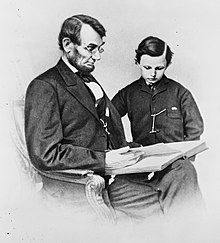




[[File:Lincoln Nation of Readers2.jpg|thumb]]
Anthony Berger was an American photographer active during the Civil War. Berger, an employee of photographic entrepeneur Mathew Brady, took 13 photographs of Abraham Lincoln. Photos taken by Berger have been used as the basis for images of Lincoln on United States coins, currency and postage stamps for over 100 years.[1]
Berger was also the manager of Brady's studio in Washington, DC.[2]
Second only to Alexander Gardner who took 37 photos of Lincoln.
Mathew Brady is considered one of the most famous photographers of the 19th century, and the man who developed photojournalism. However, Brady, who suffered from poor eyesight which deteriorated during his professional career, took very few of the photographs credited to him. Rather, he was a photography entrepeneur who employed a team of photographers he called "operators" to take the photos.
Among other notable photographers employed by Brady were Alexander Gardner and Timothy H. O'Sullivan.
Berger took "possibly the best known photographs of Lincoln" on February 9, 1864.[4]
Basis for new $5 bill
Exhibit
February 9, 1864, seven photos, intended for use by Francis Bicknell Carpenter for his painting First Reading of the Emancipation Proclamation of President Lincoln. This painting, which is 15 feet wide, now hangs above a stairway in the United States Senate wing of the United States Capitol Building.[6]
"a visual legacy of the Civil War president"
"It is the image for the five dollar bill, a fifteen-cent stamp in 1866, the image for the penny, and a three-cent stamp in 1920."
One of the photos taken by Berger that day, showing Lincoln seated in the room now known as the Lincoln Bedroom, was "an important reference for the Bush refinishing project begun in 2002"
Brady suffered eye problems, so used a team of hired photographers to actually take the photos.[9]
Controversies about penny
Berger also photographed Lincoln again on April 26, 1864, to provide material for Carpenter's painting.[12] These photos were taken in the Cabinet Room at the White House. Among these photos is one called the "broken plate Lincoln", which was lost until 1947.[13]
References
edit- ^ Nardo, Don (2009). Mathew Brady: The Camera Is the Eye of History. Enslow Publishers, Inc. p. 58. ISBN 9780766030237.
- ^ Hamilton, Charles (1985). Lincoln in photographs: an album of every known pose. Dayton, Ohio: Morningside Books. ISBN 9780890290873.
{{cite book}}: Unknown parameter|coauthors=ignored (|author=suggested) (help) - ^ Pritzker, Barry (2005). Mathew Brady. JG Press. p. 10. ISBN 1572153423.
- ^ Davis, William C. (1998). Civil War Journal: The legacies. Thomas Nelson Inc. ISBN 9781558534391.
{{cite book}}: Unknown parameter|coauthors=ignored (|author=suggested) (help) - ^ Mackey, Robert (February 12, 2009). "'Emo Lincoln' Gets the Flickr Treatment". New York Times. Retrieved December 19, 2011.
{{cite news}}: Unknown parameter|coauthors=ignored (|author=suggested) (help) - ^ "First Reading of the Emancipation Proclamation of President Lincoln". Art & History Home. United States Senate. Retrieved December 21, 2011.
- ^ "Picturing President Lincoln Exhibit". U.S. Department of the Treasury, Bureau of Engraving and Printing. Retrieved December 19, 2011.
- ^ "Abraham Lincoln, February, 1864". Library of Congress Shop. Library of Congress. Retrieved December 19, 2011.
- ^ Widmer, Ted (July 25, 2011). "The All-Seeing Eye". New York Times. New York City. Retrieved December 21, 2011.
{{cite news}}: Cite has empty unknown parameter:|coauthors=(help) - ^ Norton, Roger. "THE CONTROVERSY OVER THE LINCOLN PENNY". Abraham Lincoln Research Site. Retrieved December 21, 2011.
- ^ Allman, William G. "The Lincoln Bedroom: Refurbishing a Famous White House Room" (PDF). White House Historical Association. Retrieved December 19, 2011.
- ^ Post, Robert C. (1980). Every Four Years: The American Presidency. Smithsonian Exposition Books.
{{cite book}}: Unknown parameter|coauthors=ignored (|author=suggested) (help) - ^ Lorant, Stephan (1969). Lincoln: A Picture Story of His Life. New York: W. W. Norton & Company.
- ^
{{cite book}}: Empty citation (help)